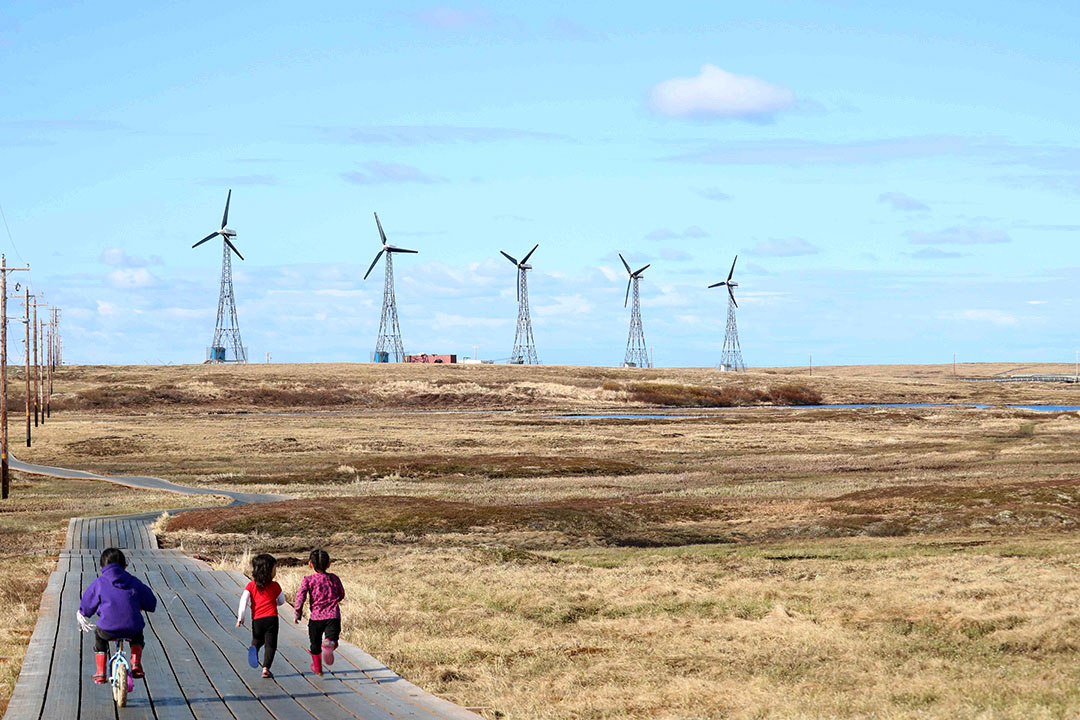
Keeping the lights on in Canada's North
USask program offers a transformative opportunity through renewable energy for Indigenous people
By John GraingerA unique program offered through the School of Environmental Sustainability (SENS) at the University of Saskatchewan (USask) aims to enhance the economic future of Canada’s northern communities.
Supported by a generous $250,000 donation from the Suncor Energy Foundation, the Removing Barriers to Energy Security in Indigenous Northern Communities program allows students to lead their home communities out of reliance on outdated and aging energy infrastructure while earning a master’s in energy security.
“We’re really excited to be working with the Suncor Energy Foundation,” says Dr. Greg Poelzer (Ph.D.), the architect of the SENS program. “There’s no other university in Canada that is working with remote Indigenous communities directly and in building capacity for the energy transition in expanding the economic value proposition that renewable energy investments can make.
“It was a complete alignment of values with the Suncor Energy Foundation of where we want to see a future Canada and a complete alignment of values of where we want to see the world going in terms of the global energy transition,” says Poelzer, a Fulbright scholar who is the co-lead on the Fulbright Arctic Initiative.
Poelzer says urban residents often don’t think of the issues surrounding energy sustainability that often face rural and Northern communities across Canada.
“Right now, with the energy transition, we have the best opportunity in over 100 years to try to build economic reconciliation. This will bridge and build a stronger Canada.”
An important piece to this program is participating students don’t have to travel to Saskatoon to complete their studies as they are conducted online remotely and at times that are accessible for the student.
Many students are already holding down regular day jobs in their communities and need to find time to handle the academic workload. This program allows students to fit their studies into their lives thanks to the online delivery.
Poelzer also says the federal government is investing billions in Canada’s North right now which is opening the door to employment opportunities for Indigenous residents to lead energy projects.
“What our program does is really address those needs.”
Dr. Karsten Liber (Ph.D.), the executive director of SENS, says it’s a life-changing program for students.
“That’s the whole point of this, is to not only provide education but open up opportunities for people in the North who don’t have the opportunity to participate in university in general.”
“It’s an interesting program with tremendous potential and there’s nothing like it anywhere else.”
One of the most interesting components of this project, says Liber, is that the program offers students the chance to learn and deal with how to address specific energy needs and obstacles a community may face.
“They actually become a champion within the community because outside people can’t really come into a community and tell them what to do. It doesn’t work that way today.
“You need that community energy champion embedded within that community because they can understand the issues and build the supports needed and then can help recruit the people needed to make it happen.”
Liber adds that the program creates capacity within the students’ communities to take better control of their energy futures.
For the Suncor Energy Foundation, the program fits one of their funding priorities related to changing and evolving energy issues and needs.”
“It’s an exciting initiative,” says Cassandra Litke Wyatt, a senior adviser at SEF, because the program aims to reduce or eliminate barriers for students and community members.
“We also look for things that are going to contribute to a more sustainable economic system. In the case of USask’s application, it was very clear the program was designed with students and community in mind.”
Liber says the issue of providing access to education for students remains paramount to USask and SENS and the support from the Suncor Energy Foundation helps to reduce that barrier.
“Since many people have jobs and families, it can’t be a full-time program. So, we’ve created it to be a part-time program that is offered over two years,” says Liber.
He adds that the program is so important, SENS’ faculty has helped to adjust the program delivery such as the time of day to the courses are delivered.
“If you want to target a community, you have to cater to their needs.”
The financial burden of pursuing post-secondary education is another challenge students face.
“In order to provide that access, we really needed to find someone who’s willing to help us provide scholarships and bursaries and that’s where the Suncor Energy Foundation comes in. I am absolutely thrilled with the foundation’s contribution.”
Liber adds that the USask mandate of “being what the world needs” is really taken to heart.
“Within SENS, we’ve taken that mantra incredibly seriously and we are actually trying to restructure all of our programs to better be what the world needs.”
Poelzer says the success of the program will draw more interest from post-secondary and industry leaders because USask is the only institution in Canada trying to address the energy needs of Northern communities.
“Now we’re going to be able to build a world-class curriculum with the best subject matter experts, so it’s not an exaggeration, we are the global leader in this field.”

